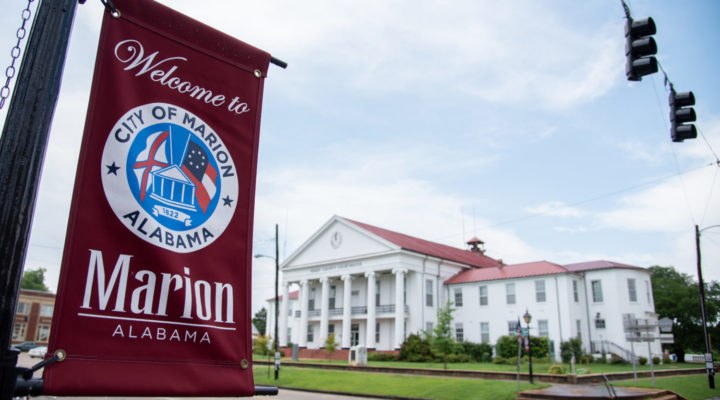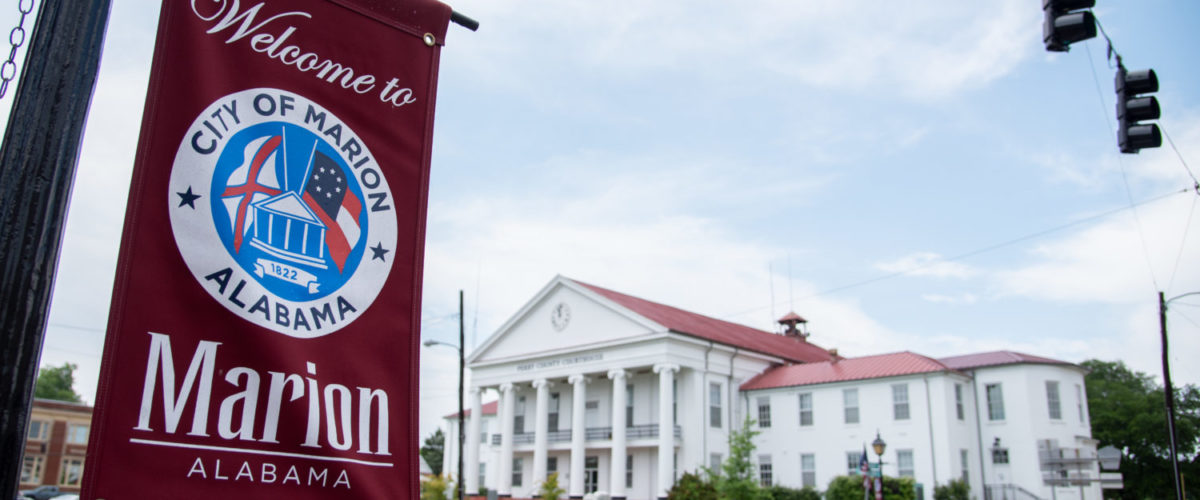God willing and the creek don’t rise, Sowing Seeds of Hope would host its first community-wide workshop addressing youth with complex traumas. Except the creek did rise, like nobody in Marion, Alabama, had ever seen before.
A ferocious downpour set in across Perry County, carving thousands of tiny canyons through the iron-red clay. By afternoon, the brooks and rills cutting through the county seat of Marion were beginning to cap. Roads became surging waterfalls. Cascading floods ripped manhole-size chunks of asphalt from the pavement. Muddy hillsides gave way to the surge, sending tangled brush and beer bottles tumbling to the streets below. Even so, the storm persisted.
Early the next morning, Sowing Seeds of Hope director Frances Ford woke to a small lake in her yard, slowly encroaching on her back doorstep. Her husband was out of town and the wheels of her car were no longer visible below the murky tide. Suddenly, an alarming reality set in — she was trapped and couldn’t get out alone. She quickly dialed county rescue officials, who arrived momentarily, loaded her into one of their tow trucks and drove her to safety.
“What do I owe you? What can I do?” Ford asked as they reached high ground.
“Just call us anytime you need us,” the officials replied.
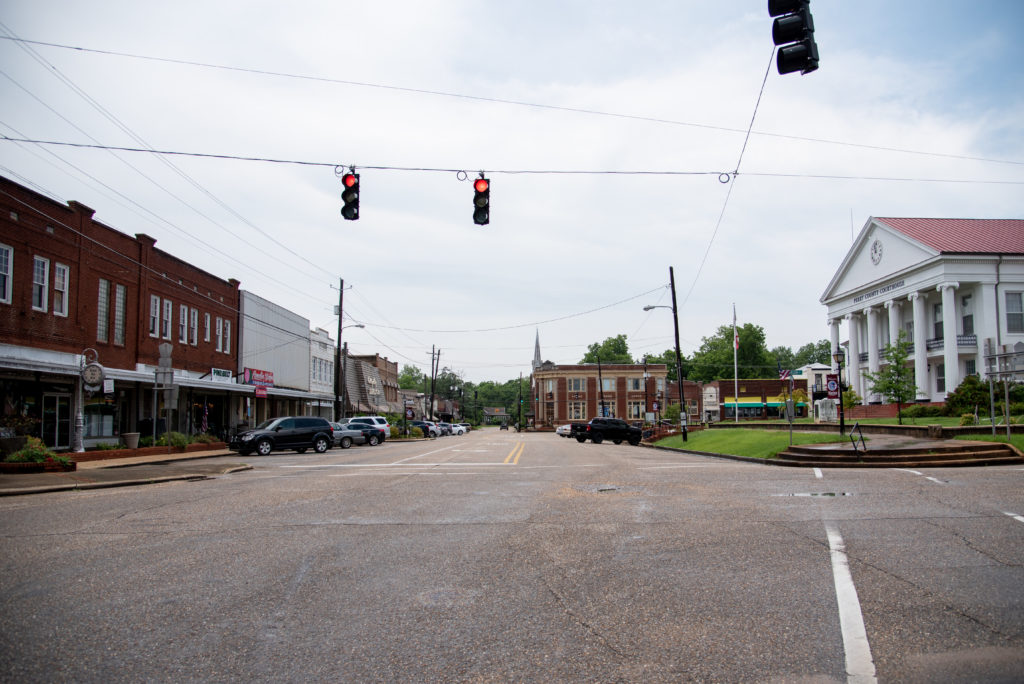
Today, 68% of Perry County’s 9,300 residents are African American and black and are 2.3 times as likely as a white resident to live below their poverty threshold.
After borrowing her daughter’s car, Ford returned to her office at the Ed Daniel Job Training Center to check on her colleagues and reschedule the trauma workshop. But the story remains: the woman who has been saving lives in Perry County for two decades needed saving as well, and the work of developing vulnerable rural communities will not survive the whims of one person. The barrage of rural poverty, as relentless as the beating rain, requires that we cling to partners, even imperfect ones. And perhaps there is no cost too high to ensure that a community takes ownership of its struggle and development from poverty.
That’s the story of Sowing Seeds of Hope, Ford says, and the only way rural development work will ever survive. As the Cooperative Baptist Fellowship’s rural development coalition, Together for Hope, nears the end of its initial 20-year commitment to fighting rural poverty across the country, it’s time to take stock of how well TFH has surrendered ownership and leadership of that work to local, sustainable partners, she explains.
“Until a year or two ago, I would say we had a C-minus, but now I think we’re at a B-plus,” Ford says.
“If we had been just another organization or non-profit, it would not have been the same. But because we’re a faith-based organization, founded on Matthew 25:40, and have churches that are also built upon Christ as a cornerstone and foundation, those churches and faith organizations are now willing to say, ‘We’re going to take the torch. We will continue this good work.’”
One of the most unlikely torch-bearers of that work is Judson College, a small, Baptist women’s school located in the heart of Marion. As the civil rights movement reached a fever pitch in 1965, Judson’s all-white student body was confined to campus and remained largely oblivious to the revolution happening just outside their door. Thanks to the long and progressive tenure of David Potts, Judson’s former president, the college began a movement of solidarity with Marion’s black community and has served as one of SSH’s closest partners since its inception in 2000.
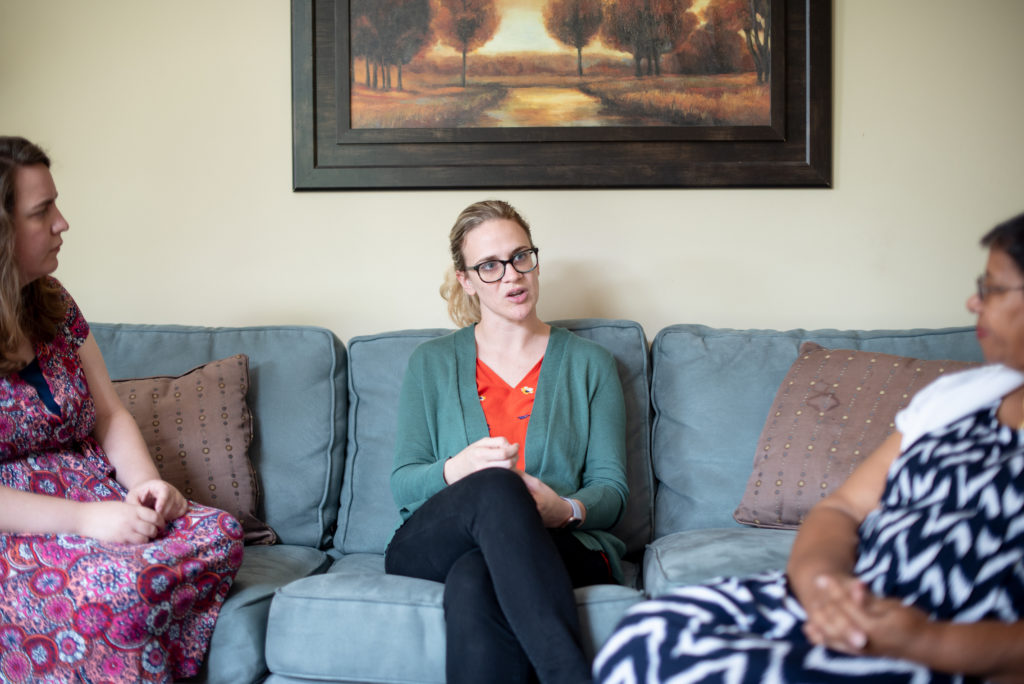
Susan Jones, dean of students at Marion’s Judson College, and Amy Butler, director of faith-based service and learning, not only engaged with Sowing Seeds of Hope as student volunteers, but now have committed Judson’s student body to the work of partnering with SSH and investing in the development of the Perry County community.
Susan Jones, Judson’s senior vice president and dean of students, says her life was wholly transformed through engaging as a student volunteer and intern with Sowing Seeds of Hope, so much so that she returned to Marion after earning her master of divinity degree at the former International Baptist Theological Seminary in Prague, Czech Republic. In conjunction with Amy Butler, Judson’s director of faith-based learning, Jones has established a once-inconceivable trust with Perry County families, 68 percent of whom are black and 40 percent of whom live below their federal poverty threshold. Joining the work of rural development, however, isn’t just good pedagogy, Jones says. It’s the compelling work of justice.
In partnership with Sowing Seeds of Hope, Judson students now work in local schools tutoring students, remodeling classrooms and distributing children’s books. Students also volunteer in SSH’s ongoing home repair projects and health fairs as well as assist parents in enrolling their children in AllKids, Alabama’s state-sponsored health insurance. Judson’s reach has further extended to advocacy alongside Ford and SSH. Together, they brought the first dialysis clinic to Perry County and are now engaged in bringing the county’s first hospital to Marion.
“Health injustice has been a driving force for me,” Jones says. “Most of what we’ve said to garner support for that and illustrate to people who have pushed back is simply that people in Perry County deserve a hospital. We want people to think about systemic issues and the things that people in our community don’t have, just by nature of where there live. There is so much injustice in that. Because you have a heart attack and live in Perry County doesn’t mean you have any less right to treatment than someone who lives in Birmingham.”
Judson students have even begun attending Eagle Grove Baptist Church, a majority-black congregation just across the square from Judson and another torch-bearer. Last year, Eagle Grove had a vision, says LaQuenna Lewis, director of Eagle Grove’s new community development organization. What if one of Perry County’s own churches moved beyond worship and charity to engage the difficult work of development? Communities Empowered and Transformed ministries (CET) was born, and Lewis, a recent transplant from Los Angeles, set aside her first year to learn about the real lives of Perry County residents and gain their trust.
“Perry County is a place that is unnecessarily deteriorating,” Lewis says, “but it’s something that can be restored.”
“A lot of people are hurting. The first need I saw was nutrition, which plays a huge part in people’s lives and in education, period. I saw homes deteriorating. I saw elderly people not being attended to, youth that were lacking academically. I noticed that our community has gotten used to receiving, and has forgotten that the true blessing is in the giving. So we began inviting volunteers to come and be a part of the giving process and show them how healing it is.”
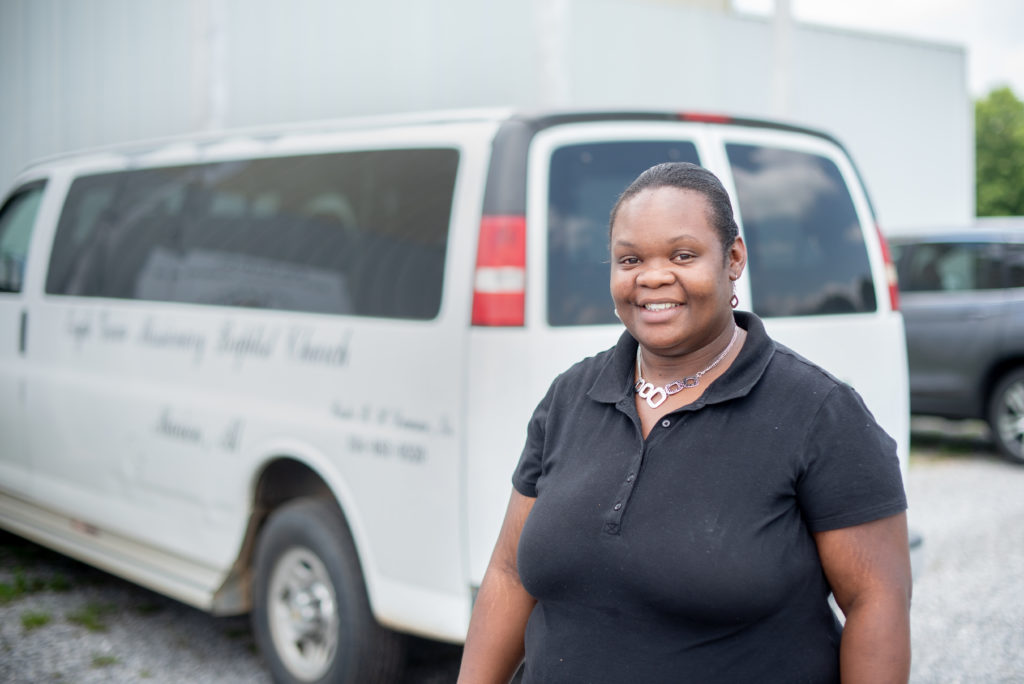
LaQuenna Lewis serves as leader of CET ministries, a nonprofit of Eagle Grove Baptist Church and one of Sowing Seeds of Hope’s newest development partners.
After partnering with Sowing Seeds of Hope for years, Lewis says, Eagle Grove is now stepping to the forefront of asset-based development in Perry County with CET ministries. The formation of CET coincided with the church’s acquisition of two new properties, where they now host a displacement shelter for women fleeing domestic violence and families who have endured fires or eviction. CET’s new facility also hosts a free clothing shop, which they established when SSH closed their own clothing bank for lack of space. Both CET and Sowing Seeds of Hope continue to swap referrals and resources as they encounter the complex needs of their low-income clients.
While CET provides immediate resources to their community, including bagged lunches for the more than 30 percent in Perry County who remain food insecure, the true goal is to establish programs that empower rather than simply help, Lewis explains.
“When you help, you put people in a position where they can go right back to that poverty-stricken mindset — because it’s a mindset too — but also a way of life. You’re not teaching anything. You can’t just help and leave. You have to really take time and effort. That’s why we’re developing multiple programs, such as an employment training program, to truly empower. When you empower someone, you’re giving them the tools they need to not only survive but to be a blessing to their community and to build it themselves.”
On many days, the endless work of combatting rural poverty leaves you in the dark, utterly hopeless, Frances Ford says, but as Perry County’s own begin to build it themselves, hope flickers. True asset-based community development is sluggish work, and, at times, maybe impossible work. Anyone who professes otherwise is making a cheap sale or worse, perpetuating smug and paternalistic systems of helping among communities that deserve ownership.
Ensuring ownership, even leadership, among communities in poverty often comes at the expense of speedy results or glamorous statistics. But spend even a day talking with the restrained and resilient people of Perry County and you will soon learn that numbers and results are for trustees. The true test of rural development is whether the work itself will survive your absence, Ford explains. And a 20-year commitment to the 20 poorest counties in the United States? That could only be the beginning of a work that will last generations or longer, Ford says in conclusion.
“Sowing Seeds of Hope, the founding members, planted the seed and many of us have come along and watered it, but as years progress, we will see how God has produced the fruit. The fruit doesn’t always come at one time. It will be generations. But there will be a bountiful harvest that will come and it will come as a result of the work of many.”
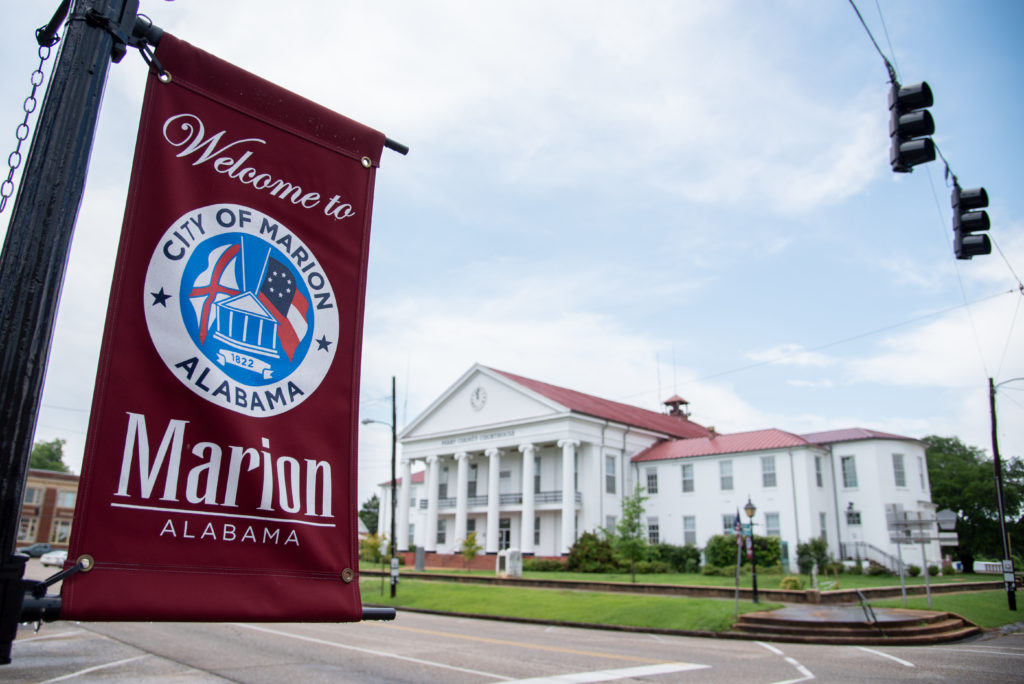
Swaths of remote farmland give way to the Perry County seat of Marion, Ala.
Read more in the Perry County, AL Series
‘Everything to Me’: A resilient couple finds home and hope in one of Alabama’s poorest communities
Photo Gallery: Perry County Alabama
Perry County, Alabama: Fields of Paradox
Video: Frances Ford on Justice
Related commentary at baptistnews.com:
There is nothing too good for the poor | Greg Jarrell
Are the poor really blessed? | Chuck Queen
Related news at baptistnews.com:
White House panel report says system, not personal decisions, drive poverty
Alabama: Perry County is a series about holding a healthy tension between a perspective of scarcity and one of joy and strength. What, in all realities, appears to be extreme poverty may actually represent generations of strong, resilient families who have made a true home in Perry County. This series in the “Resilient Rural America” project is part of the BNG Storytelling Projects Initiative. Has the United States forgotten its countryside? What strength and resilience may yet be stirring outside our city limits? In “Resilient Rural America,” we attempt to answer these questions when we visit these unique communities to examine the singular nature of poverty in rural America and tell the stories of development among its courageous and resilient people.
_____________
Seed money to launch our Storytelling Projects initiative and our initial series of projects has been provided through generous grants from the Christ Is Our Salvation Foundation and the Eula Mae and John Baugh Foundation. For information about underwriting opportunities for Storytelling Projects, contact David Wilkinson, BNG’s executive director and publisher, at [email protected] or 336.865.2688.

